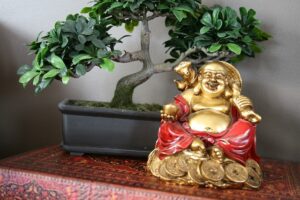Qi » Wellness Blog » Fengshui Information » The Ancient Chinese Practice of Fengshui

The Ancient Chinese Practice of Fengshui

What Does Fengshui Mean?
- Fengshui, translated as “Wind-Water,” is an ancient Chinese practice aimed at achieving harmony with one’s environment.
- It focuses on homes, businesses, and other buildings to ensure that Qi (energy) flows smoothly through the environment.
History of Fengshui
- Fengshui is believed to have existed for about 6,000 years, making it older than many other practices in Traditional Chinese Medicine.
- Early practitioners connected the practice to the night sky and incorporated stars’ positions into city planning and home organization.
Use of Astronomy
- Ancient Fengshui required knowledge of astronomy, as it involved observing the stars. Chinese astronomy was highly advanced in ancient times.
- Modern practices rely heavily on the magnetic compass, but it was practiced for thousands of years before this invention.
Fengshui and Qi
- Fengshui, like practices such as meditation, Qigong, diet, and acupuncture, deals with the flow and balance of Qi.
- While these practices regulate Qi within the human body, Fengshui applies similar principles to the external environment.
Schools
- There are various schools of Fengshui, each teaching different methods and techniques.
- Some of the major schools include Compass (Chinese), Form (Chinese), Aspiration (Western), and Black Sect (Western).
Western Adaptations
- The Black Sect method of Fengshui, which focuses on interior design and harmony, became more popular in Western countries, including the US and the UK.
- This method is quite different from traditional Fengshui.
Global Presence
- Fengshui has not gained as much global popularity as other Traditional Chinese Medicine practices like acupuncture but is practiced in various countries.
- English-speaking countries have adapted to it better than most other Western nations.
Suppression in Modern China
- The practice faced suppression in mainland China after the Communist Party took control in 1949.
- During the Cultural Revolution, it was deemed superstitious and ineffective.
- Practitioners have faced persecution, and the practice went into decline in mainland China.
- The practice is more popular in Taiwan and Hong Kong.
Despite its turbulent history in mainland China, Fengshui remains historically significant and relevant to those interested in Qi flow beyond Qigong movements and TCM theory.
Alex Wolfgram
Alex Wolfgram is the creator of Qiful Life. After spending nearly a decade in Asia learning Qigong, Meditation, Tea Chinese Medicine concepts and Buddhism, he decided to move back to the U.S. and begin sharing what he absorbed. Alex currently teaches Qigong and Meditation by private appointments via Qiful Life's platform. He also hand picks each of the teas offered on the site. Currently, Alex is developing the Qiful Life podcast covering subjects related to Chinese health concepts, Spirituality and the Dao De Jing.





